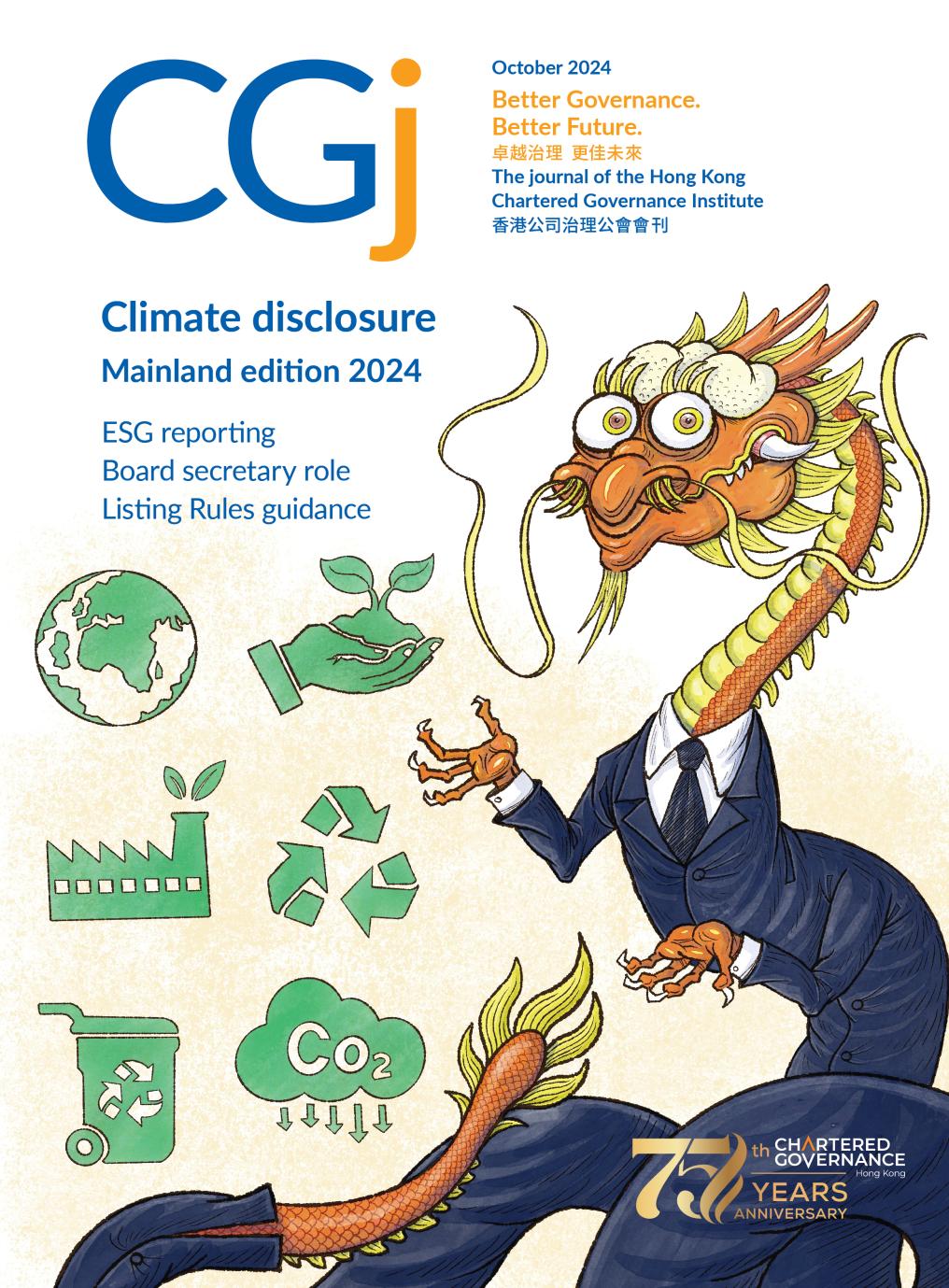
ESG reporting and climate disclosure practices
CGj reviews two Institute roundtable meetings on ESG and climate disclosure practices in the Chinese mainland, held in March 2024 with a number of industry leaders and experts in the field as speakers, and looks at the new trends in sustainable development.
Highlights
- sustainable development and ESG practices are become increasingly important in the Chinese mainland
- ESG is a collective effort that requires continuous improvement, in which even small actions, such as reducing travel emissions, can bring about change
- for companies at the early stages of ESG management, a good strategy is to look at the disclosures of peers who are already performing well, identify what you can do and recognise what you cannot yet achieve
Sustainable development and ESG practices are becoming increasingly important in the policy and corporate spheres, and have attracted extensive attention from global capital markets and regulatory bodies. In March 2024, the Institute held two roundtable meetings on ESG reporting and climate disclosure practices, one in Beijing and the other in Shanghai. These meetings brought together industry leaders and experts to explore how companies can effectively manage and disclose their performance and climate-related information in today’s global business environment.
How companies can excel in ESG practices
Establishing a sustainable development system
At the Beijing roundtable meeting, Wang Xuan, Responsible Person for ESG and Sustainable Development of the Lenovo Group, and Secretary General of the Lenovo China Platform ESG Committee, detailed Lenovo’s comprehensive ESG strategies in her address.
She explained that the Lenovo Group, as one of the earliest companies in China to practise ESG, regards ESG and social value as foundational pillars of the company. From the perspectives of serving the nation, the industry, people’s livelihoods and the environment, Lenovo actively pursues corporate social value. Within the group, ESG-related work is carried out through five major systems – organisation, output, communication, empowerment and objectives. Notable progress includes the establishment of the ESG Executive Supervision Committee in 2021 and the Lenovo China Platform ESG Committee in 2022, which have strengthened the group’s sustainable development efforts.
Lenovo prioritises transparent ESG information disclosure. In June this year, the Lenovo Group released its Sustainable Development Report for the 18th consecutive year and ensures comprehensive communication with stakeholders through various reports such as the Carbon Neutral Action Report and the Biodiversity Protection Innovation Practice White Paper.
Lenovo’s green initiatives include committing to achieving net-zero greenhouse gas emissions across the entire value chain by the 2049/50 fiscal year, gradually establishing a completely green supply chain management framework, leveraging innovative technologies to create zero-carbon factories and reducing data centre energy consumption. Additionally, Lenovo has launched ‘zero-carbon’ products, and a carbon footprint and reduction platform for employees.
In social welfare, Lenovo focuses on enhancing quality of life by empowering communities through technology, revitalising rural areas, and supporting small and medium-sized enterprises. In governance, Lenovo continually addresses issues concerning international trade security and export control, antitrust and unfair competition, business ethics and compliance, data security and privacy protection, AI ethics and ESG management, etc. ‘With years of practical experience, Lenovo has established a comprehensive corporate compliance management system that is integrated into Lenovo’s DNA and incorporated into its regular operations and management,’ Ms Wang concluded.
Integrating ESG into business strategies
Ma Jinru FCG HKFCG, Vice President, Board Secretary and Company Secretary of Goldwind Science and Technology Co Ltd, stated that since 2016 Goldwind has published annual sustainable development reports and has frequently introduced new initiatives, including regulating carbon emissions and setting up zero-carbon factories. She highlighted the importance of integrating ESG into corporate management: ‘All departments and subsidiaries within the group already face performance-indicator pressure, so meeting ESG targets is challenging. It requires conceptual support and management skills.’
Goldwind ensures accurate ESG data across its 1,000-plus subsidiaries through a unified internal statistical system. ‘We created carbon accounts for each subsidiary and sub-business unit in 2023. With these carbon accounts, enterprises can gauge their carbon emissions, including for each project, as well as their annual carbon emissions trajectory for this year, next year and the year after, and whether they are going up or down,’ Ms Ma explained. This transparency helps set realistic ESG targets and meets disclosure requirements.
Goldwind advocates green production and green operations, and aims to achieve 100% green power usage by 2031. To reach this goal, Goldwind began assessing the carbon footprint of its wind turbine products in 2020. In that year, the average carbon emissions per kilowatt-hour for Goldwind’s turbines was 7 grams, which was reduced to around 4 grams in 2023. Ms Ma noted that ‘the average lifecycle carbon emissions for wind power is 12 grams per kilowatthour and we have significantly reduced those emissions, which is of substantial social significance.’
Ms Ma emphasised that ‘ESG is not something abstract – it must be combined with production, operations and R&D to improve disclosure and performance, as well as to obtain real data, thus allowing companies to achieve relevant goals in practice.’
Forming a dedicated team
Huang Chaoquan FCG HKFCG, Vice President and Board Secretary of Huaneng Power International Inc, praised Lenovo and Goldwind’s good work on carbon emissions. He clarified that, as a power generation company with a relatively high proportion of traditional energy, Huaneng places great importance on building an ESG management system. The company conducts daily management of ESG metrics and promptly releases reports in accordance with regulatory requirements. The company has already carried out energy-saving, emissions-reduction and carbon-reduction modifications for thermal power units and has initiated carbon capture work.
Mr Huang noted that China is developing rapidly, with an increasing focus on wind and solar energy. Establishing a robust ESG management system, adhering to regulations and accelerating the development of renewable energy are very important for power generation companies. ‘In promoting ESG, it is essential to systematically plan and to advance in an orderly manner consistent with developments in the industry, as well as the company sector and stage of development, aligning with higher goals and implementing feasible measures that suit the company’s actual situation to progressively enhance management levels.’
China is developing rapidly, with an increasing focus on wind and solar energy
Xie Jilong FCG HKFCG, Executive Director and Vice President of China United Insurance Holdings Co Ltd, pointed out that ESG-related work typically involves multiple departments, with the board secretary’s office responsible for information disclosure. He emphasised that board secretaries should routinely educate all departments about ESG, and develop unified corporate governance guidelines and information disclosure requirements to avoid last-minute rushes.
Mr Xie outlined five key points for effective ESG practice – experience sharing, leadership attention, strict supervision, forming professional teams and keeping an eye on market trends. He stressed the importance of accurate and complete data collection, stating: ‘If metrics are inconsistent and not aligned, the data becomes unreliable. Disclosure requires authenticity, accuracy and completeness, and, if the data is not valid, the quality of disclosure will be significantly compromised.’
Ban Zefeng, Vice President and Board Secretary of New China Green Energy Co Ltd, shared that New China Energy has been publishing ESG reports since 2015 in accordance with the ESG Reporting Guide issued by Hong Kong Exchanges and Clearing Limited. As a renewable energy and natural gas industry company, New China Energy has an inherent advantage in reducing carbon emissions. However, under the ‘dual carbon’ goals, further reducing emissions in the natural gas industry remains a challenge.
Mr Ban stressed the importance of leadership in driving ESG practices and that companies need a professional ESG team and a bottom-up management system to ensure data accuracy. Companies should tailor their ESG-related work in accordance with their specific situations, and it is important to enhance their supply chain management. He concluded that ESG is a collective effort that requires continuous improvement, noting that small actions, such as reducing travel emissions, can bring about change.
“companies need a professional ESG team and a bottom-up management system to ensure data accuracy”
Disclosure and ratings
With recent developments in the business environment, global ESG regulatory organisations have each developed their own ecosystems and policies, while companies face various ESG requirements and demands from stakeholders such as regulators, customers and institutional investors.
To promote high-quality development among listed companies, the Shanghai Stock Exchange, Shenzhen Stock Exchange and Beijing Stock Exchange jointly issued ESG guidelines in April this year. Companies must publish their 2025 sustainability reports by 30 April 2026. This significantly impacts information disclosure standards and business operations for listed companies in the Chinese mainland.
Reference to international frameworks
At the Shanghai roundtable, Angel Sze FCG HKFCG, Company Secretary of Fosun International Ltd and Head of the Fosun ESG Management Committee, described how Fosun is responding to the latest regulatory requirements.
She explained that Fosun’s ESG report not only complies with the Hong Kong Listing Rules, but also incorporates the Global Reporting Initiative (GRI) framework. It also takes into account the methodologies of different ratings agencies and supports the United Nations’ Sustainable Development Goals (SDGs). ‘Regarding the preparation of ESG reports and governance, we have summarised some key points and challenges, including a roadmap and indicator settings, our level of preparedness for new challenges and how to address the latest global regulatory requirements.’
In terms of market ratings, Ms Sze mentioned that ratings agencies have different cultural backgrounds and evaluation criteria for different companies, and that companies can use ratings as a tool to optimise their ESG management. ‘Since ratings agencies use publicly available information, when preparing reports we must consider the requirements of other stakeholders, including ratings agencies, in addition to regulatory rules. This optimises the quality of our report preparation and enhances the listed company’s transparency.’
Climate reporting disclosure
Michael Wu, Director of Sustainable Development Disclosure and Management Consulting at PwC, presented a number of key strategies for climate disclosure at the Shanghai roundtable meeting. He pointed out that climate change is intertwined with human survival and that, because this is an issue of vital importance, it is attracting more intense scrutiny from regulators and investors. Therefore, understanding and mitigating climate risks and their impact on the company and the world is crucial. ‘When companies develop climate strategies, the first thing they should put in place is carbon emissions management, which involves energy conservation and carbon reduction. The second is risk management, which involves how to identify and manage climate risks and opportunities,’ Mr Wu specified.
He also suggests that companies refer to the International Sustainability Standard Board’s climate-related disclosure rules and conduct climate risk assessment, management and disclosure based on four pillars – governance, strategy, risk management, and metrics and targets. Companies can also reduce their impact on the climate and the world through active carbon reduction initiatives, such as by joining the Science Based Targets initiative (SBTi).
Regarding future ESG reporting trends, Mr Wu said: ‘Looking ahead, many companies’ reports will be 1+N, where 1 is the ESG report and N represents specialised reports, with the first N being the climate report. Some companies may also release separate carbon-related reports.’ PwC has developed proprietary ESG digital tools to assist clients in their digital transformation of ESG.
Setting clear goals
Jia Jingwei, Managing Partner of Financial Services at Oliver Wyman, indicated that companies should focus on the achievability of their goals when setting sustainable development targets. ‘Only when a company can achieve its goals will customers believe in its capabilities, impacting the company’s business and external perception.’
Mr Jia gave an example of a brewing company that set a goal of using 2.75 litres of water per litre of beer brewed by 2030, compared with the current industry standard of approximately 2.9 litres. ‘The company has set clear internal goals and customers will feel that each can of beer they drink contributes to water conservation. This approach is more effective and easier to achieve than simply talking about “carbon reduction by 2050”. It also promotes effective internal operations across departments.’
The value of ratings to companies
Zhang Yufeng, ESG Corporate Support Director for Greater China at S&P Global, reminded participants that companies should consider what value ESG ratings can bring to their sustainable development and risk avoidance.
‘Some domestic companies’ ESG-related work is still at a relatively early stage. A good strategic approach is to look at the disclosures of peers who are already performing well, identify what you can do and recognise what you cannot yet achieve. Companies also need to consider, from the perspective of investors, whether the company can effectively respond to and disclose certain important ESG metrics that investors focus on,’ he observed.
Mr Zhang also noted that in S&P Global’s Corporate Sustainability Assessment (CSA) system, over half the questions require companies to provide publicly disclosed evidence. Under such requirements, companies must offer sufficient transparency and high-quality ESG information disclosure to achieve high ESG scores.
Hsiuwen Liu
Journalist


